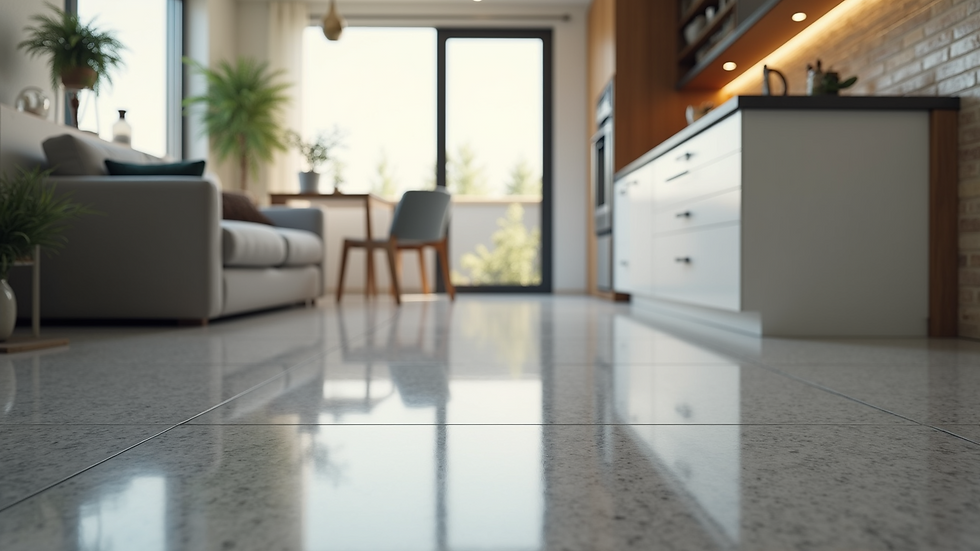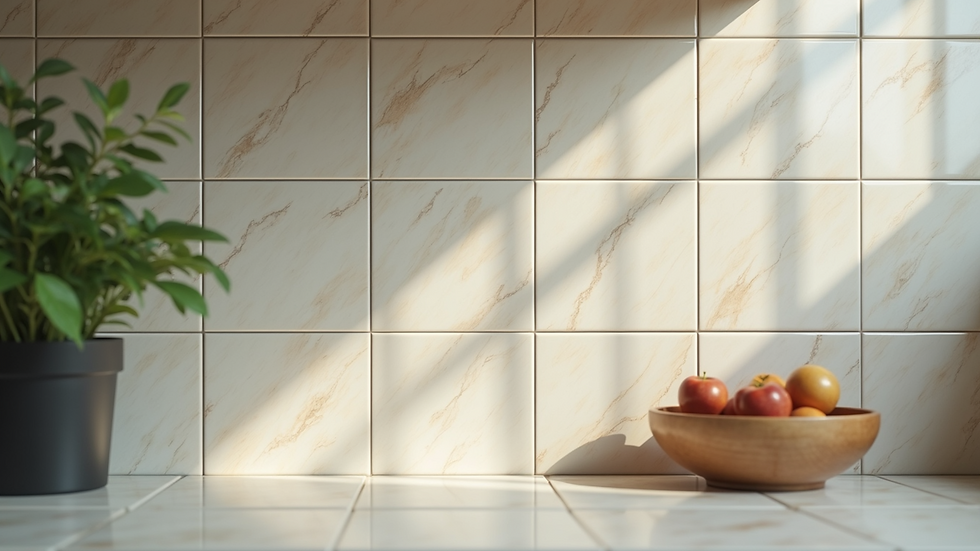Transform Your Space with Professional Epoxy Flooring Solutions
- ryelic
- Aug 1
- 4 min read
Are you looking to elevate the look of your home or business? If so, consider the transformative power of epoxy flooring. This innovative solution not only enhances the aesthetic appeal of your space but also offers durability and functionality. In this blog post, we will explore the benefits of epoxy flooring, the installation process, and how it can completely change your environment.
Epoxy flooring is a popular choice for both residential and commercial spaces. It consists of a resin and hardener that, when combined, create a strong and resilient surface. This flooring option is known for its glossy finish and can be customized to fit any design preference.
Let’s dive deeper into why epoxy flooring might be the perfect choice for your next renovation project.
The Benefits of Epoxy Flooring
1. Durability
One of the most significant advantages of epoxy flooring is its durability. It can withstand heavy foot traffic, making it ideal for both homes and businesses.
Resistant to Stains: Epoxy is resistant to spills and stains, which means it is easy to clean and maintain.
Impact Resistant: It can handle impacts from dropped items without chipping or cracking.
2. Aesthetic Appeal
Epoxy flooring comes in a variety of colors and finishes. This versatility allows you to create a unique look that matches your style.
Glossy Finish: The shiny surface reflects light, making spaces appear larger and brighter.
Custom Designs: You can incorporate patterns, colors, and even textures to create a one-of-a-kind floor.
3. Cost-Effective
While the initial investment may seem high, epoxy flooring can save you money in the long run.
Low Maintenance: Its durability means fewer repairs and replacements over time.
Energy Efficiency: The reflective surface can help reduce lighting costs by enhancing natural light.
4. Safety Features
Epoxy flooring can be designed with safety in mind.
Slip-Resistant Options: You can add anti-slip additives to improve traction, making it safer for high-traffic areas.
Fire Resistant: Epoxy is also resistant to fire, adding an extra layer of safety to your space.
The Installation Process
1. Preparation
Before installation, the surface must be properly prepared.
Cleaning: Remove any dirt, grease, or old flooring materials.
Repairing: Fill in any cracks or holes to ensure a smooth surface.
2. Application
The application process involves several steps.
Priming: A primer is applied to enhance adhesion.
Mixing: The epoxy resin and hardener are mixed according to the manufacturer's instructions.
Pouring: The mixture is poured onto the prepared surface and spread evenly.
3. Curing
After application, the epoxy needs time to cure.
Drying Time: Depending on the product, curing can take anywhere from a few hours to several days.
Final Touches: Once cured, any additional coatings or finishes can be applied.
Choosing the Right Epoxy Flooring
When selecting epoxy flooring, consider the following factors:
1. Type of Space
Different spaces have different needs.
Residential: For homes, you might want a more decorative finish.
Commercial: For businesses, durability and safety features may be a priority.
2. Color and Design
Choose colors and designs that complement your existing decor.
Neutral Tones: These can create a timeless look.
Bold Colors: These can make a statement and add personality.
3. Professional Installation
While DIY options exist, hiring professionals ensures a high-quality finish.
Experience Matters: Professionals have the skills and tools to do the job right.
Warranty: Many professional services offer warranties, giving you peace of mind.
Real-Life Examples
Residential Spaces
Imagine walking into a modern kitchen with a sleek, glossy epoxy floor. The reflective surface not only looks stunning but also makes cleaning up spills a breeze.
Commercial Spaces
Consider a bustling garage or workshop. An epoxy floor can withstand the wear and tear of heavy machinery while providing a safe, slip-resistant surface for workers.
Maintenance Tips for Epoxy Flooring
To keep your epoxy flooring looking its best, follow these simple maintenance tips:
1. Regular Cleaning
Sweep or vacuum regularly to remove dirt and debris.
Mopping: Use a damp mop with a mild detergent for deeper cleaning.
2. Avoid Harsh Chemicals
Some cleaning products can damage the epoxy surface.
Gentle Cleaners: Stick to pH-neutral cleaners to maintain the finish.
3. Address Damage Promptly
If you notice any scratches or chips, address them quickly.
Repair Kits: Many manufacturers offer repair kits for minor damage.
The Future of Epoxy Flooring
As technology advances, so does the world of epoxy flooring.
Eco-Friendly Options: More manufacturers are creating environmentally friendly epoxy products.
Innovative Designs: New techniques allow for even more customization and creativity.
Transform Your Space Today
If you are ready to transform your space, consider professional epoxy flooring solutions.
Consultation: Reach out to a professional for a consultation to discuss your options.
Get Inspired: Look for inspiration online or in showrooms to find the perfect design for your needs.

In summary, epoxy flooring is a versatile and durable option that can enhance the look and functionality of any space. With its many benefits, including aesthetic appeal, cost-effectiveness, and safety features, it is a smart choice for both residential and commercial applications.
Whether you are renovating your home or upgrading your business, epoxy flooring can provide the transformation you desire. Take the first step today and explore the possibilities that professional epoxy flooring solutions can offer. Your space deserves it!
![Expert Roof Repair and Installation Services in [specific location]](https://static.wixstatic.com/media/86543b_f475da2e2e4b4a3f98959604e6feaa2f~mv2.png/v1/fill/w_980,h_551,al_c,q_90,usm_0.66_1.00_0.01,enc_avif,quality_auto/86543b_f475da2e2e4b4a3f98959604e6feaa2f~mv2.png)

Comments